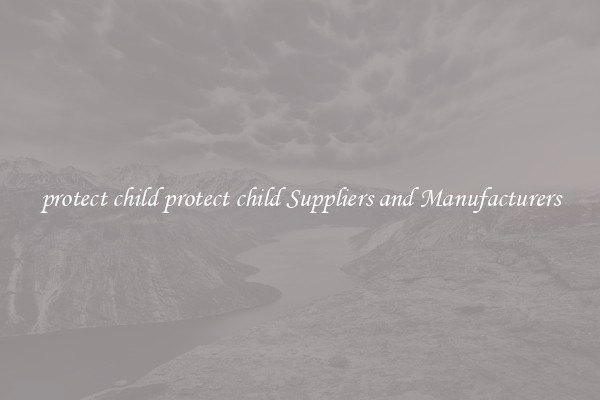protect child protect child Suppliers and Manufacturers
Protecting Children: The Role of Suppliers and Manufacturers

Child protection is a critical issue that should be a priority for suppliers and manufacturers across industries. It is the responsibility of these stakeholders to ensure that their products and processes do not harm or exploit children in any way. By implementing stringent measures to protect children, suppliers and manufacturers can play a pivotal role in creating a secure and safe environment for the younger generation.
One of the primary areas where suppliers and manufacturers can make a difference is in eliminating child labor from their supply chains. It is an unfortunate reality that in many parts of the world, children are employed in hazardous or exploitative work conditions. By conducting thorough due diligence and regular audits of their supply chains, suppliers and manufacturers can identify and address any instances of child labor. They should work towards establishing strict policies that prohibit the use of child labor and foster a culture of fair and responsible employment practices.
Apart from eradicating child labor, suppliers and manufacturers must ensure that their products are safe for children to use. This includes adhering to strict quality control procedures and complying with applicable safety regulations. Toys and children's clothing, for example, should undergo rigorous testing to ensure that they do not pose any risks to children's health or safety. By investing in research and product development, suppliers and manufacturers can create innovative and safe products that cater to the unique needs of children.
Another dimension of child protection that suppliers and manufacturers should consider is responsible marketing practices. Companies must avoid targeting children with advertisements that promote unhealthy or inappropriate products. Furthermore, the content and messaging of marketing campaigns should be ethical and should not exploit children's vulnerabilities. By adopting responsible marketing practices, suppliers and manufacturers can contribute to the overall well-being and development of children.
Lastly, suppliers and manufacturers should educate and empower their employees to recognize and report any instances of child abuse or exploitation. This can involve conducting training sessions on child protection, establishing whistleblower mechanisms, and promoting a culture of open communication. By creating a supportive environment, suppliers and manufacturers can ensure that their employees are equipped to act on any concerns related to child protection.
In conclusion, suppliers and manufacturers play a significant role in protecting children from harm and exploitation. By eradicating child labor from their supply chains, ensuring product safety, adopting responsible marketing practices, and empowering their employees, they can make a meaningful contribution to the well-being of children. It is crucial for all stakeholders to recognize their role and work collectively towards creating a world where children can grow and thrive, free from any form of harm or exploitation.

View details

View details

View details

View details








